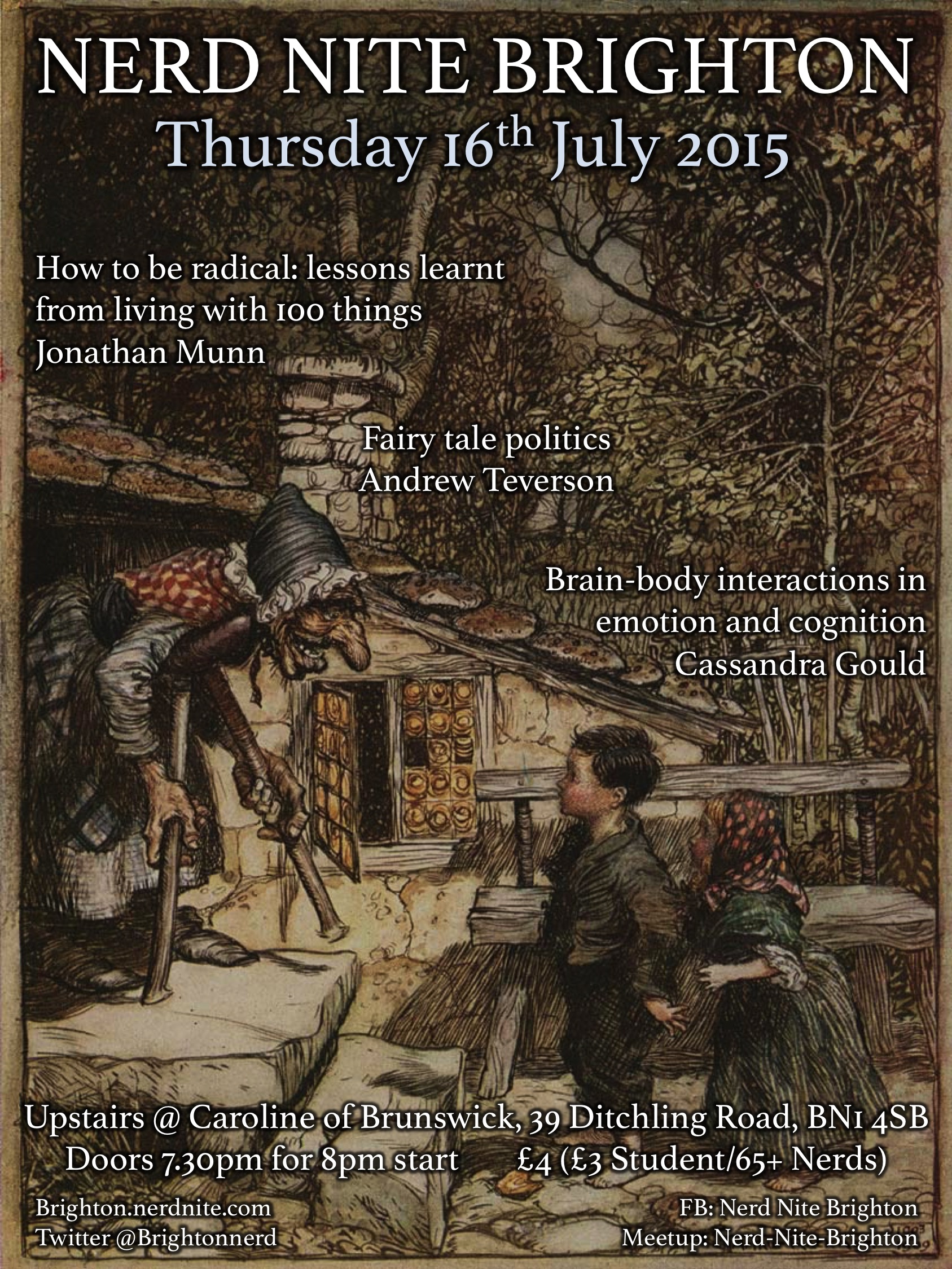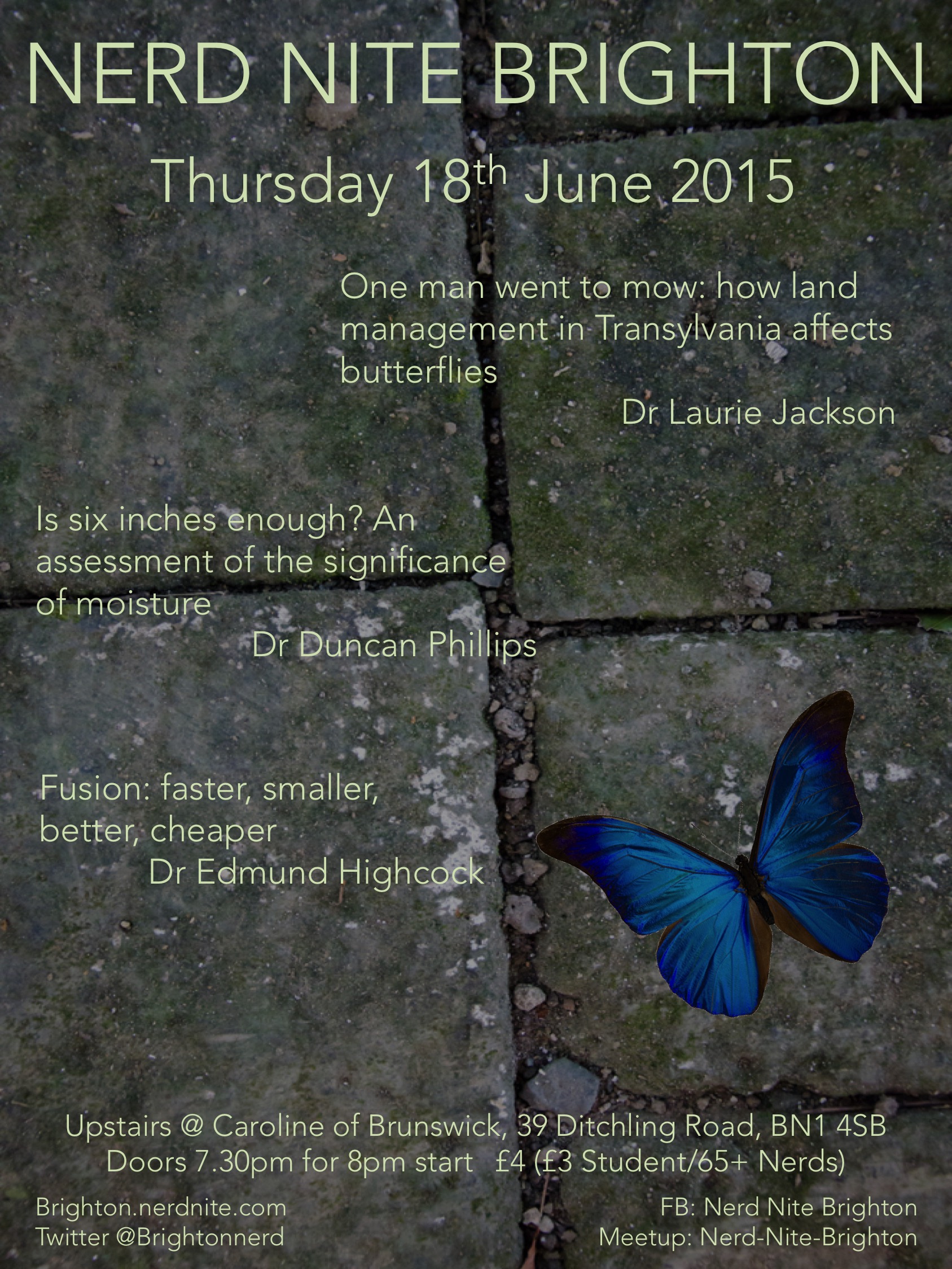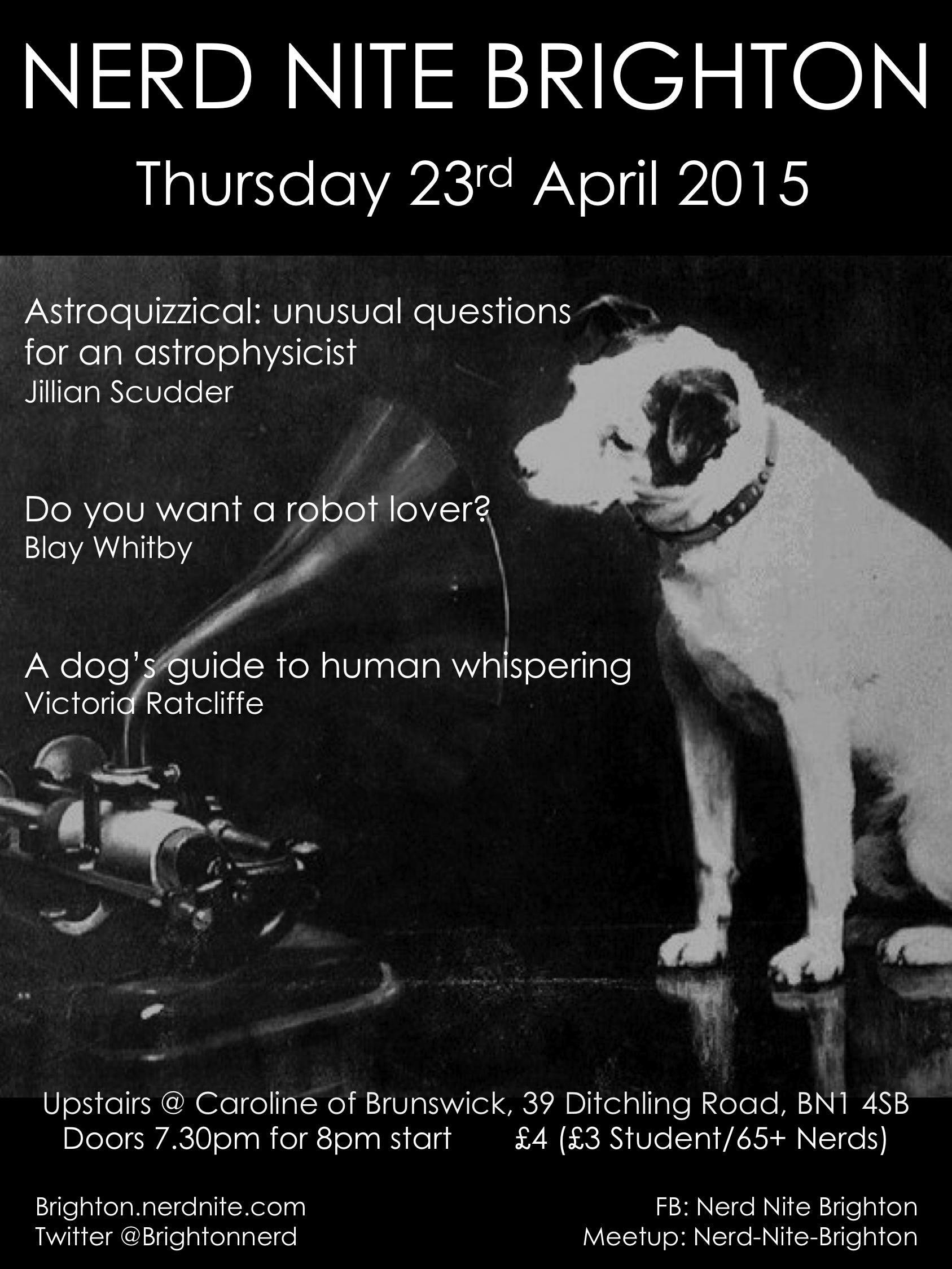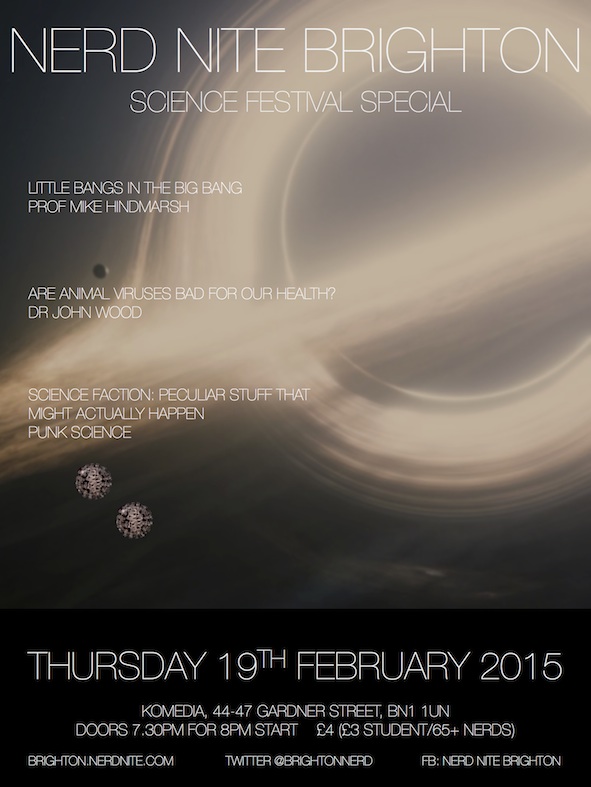Nerd Nite Brighton 26: dead animals, space doughnuts, iPhone time-wasting
Happy nerdy new year! This month we’re back at the lovely Otherplace at the Basement and our talks are:
1. Exceptionally preserved fossils – Oliver Knevitt
Think fossils and most people think of bones, teeth and shells – mineralised tissues that are not far from rocks themselves. Most organisms through history didn’t have hard material like this, and so would be invisible if these were the only fossils. Luckily, in very rare cases, soft tissues can be preserved in so-called exceptionally preserved fossils. Oliver will use evidence from rotting shrimps, fossilized eye tissue, and other fascinating examples to look at the pitfalls in taking these exceptionally preserved fossils at face value. As you will see, we are occasionally in danger of overly relying on these rare fossils to reconstruct the history of life.
Oliver teaches in the Department of Geology at the University of Brighton. Before that, he did a PhD at the University of Leicester and has amongst other things investigated ancient algae deposits in Norway.
2. Black Holes and the spaghettification of hot doughnuts – Darren Baskiil
Black Holes: what are they? Where are they? Should we fear them? Black holes get a lot of bad press, and the line between theoretical ideas and observational facts are confused at best. In this talk, you will learn what we know about black holes and what ideas remain just dreams of the theoreticians.
Dr Darren Baskill got his PhD in X-ray astronomy, discovering a few black holes in the process. He now runs the outreach programme for the Department of Physics & Astronomy at the University of Sussex.
3. Secrets of Candy Crush Revealed! David Amor
Candy Crush Saga has been downloaded 1 billion times and is played by 100 million people each day. Why is it so popular? Why is it so addictive? How is it worth more than Star Wars? David describes the psychology and science behind the game.
David has been making videogames since the ZX Spectrum. Electronic Arts, PlayStation, Xbox and most recently those addictive little games you might find on your iPhone.
_________________________________
Cake, beers, quizzing, music and the usual light fillers
Doors 7.30pm for and 8pm start
£4 regular nerds, £3 NUS/65+ nerds
Another Nerd Nite Brighton Christmas 17th December 2015
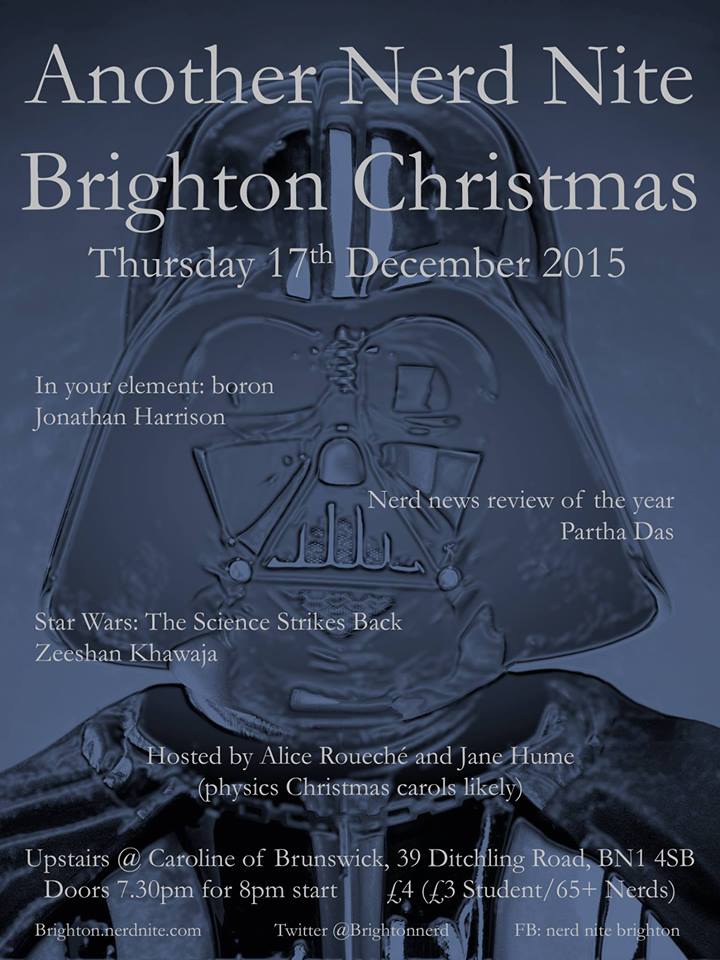
The Brussel sprouts are already on the boil, families up and down the country are preparing their topics to argue over when they get together on Christmas Day and people are queuing up for the release of some eagerly anticipated film. We on the other hand are delighted to invite you to Another Nerd Nite Brighton Christmas Special.
This festive month:
1. In your element: boron
Dr Jonathan “Sid” Harrison is perhaps the most enthusiastic man in Brighton and will be delighting us with his musings on that perhaps unsung hero of the elements, boron. The Periodic Table fans amongst you will surely be rubbing your hands in apoplectic excitement.
Sid in his real life is a general practitioner and expert in the construction of geodesic dome tents. He has never completed the Kessel Run.
2. Nerd News review of the year
There were several bona-fide talks that could have taken the second slot for the Christmas Special. Instead we’ve opted to drag Nerd Nite Brighton Boss Partha Das out to give an overview of the top nerdish news items from 2015. And, as you shall find out, what a year it has been…
3. Star Wars: The science strikes back
Last Christmas we gave you our heart and also Dr Zeeshan Khawaja who took us on a journey through the scientific (im)plausibilities of the Star Wars story. It’s a Nerd Nite Brighton pleasure to welcome him back again for more of the same and perhaps another heated debate on the fate of the Ewoks after the destruction of the Death Star.
Zeeshan is a cardiologist and has a PhD in coronary physiology and computational modelling from King’s College London which have little if anything to do with tractor beams
___________________________________________________
Hosting the Christmas special will be festive compering regulars Jane Hume and Alice Roueche.
Expect physics Christmas carols, cakes, music and merriment.
Back at the Caroline Of Brunswick, doors 7.30pm for and 8pm start
£4 regular nerds, £3 student/65+/festive nerds
Get your tickets from HERE
Nerd Nite Brighton 24: Decaying food, Punk Science, Mo Money Mo Problems
We’re back for some October nerdery!
This month we’re being hosted by Otherplace At The Basement! Lots of space for all our lovely nerds!
1. The Science of Decay – Vera Zakharov
Discover the wonderful, edible, world of food “waste”. Brighton & Hove throws away 50,000 tonnes of food every year. Yet some of the tastiest foods are technically food waste. What the heck is going on, or going off, as it were? Find out with Vera, our local foodie waste warrior.
Vera Zakharov coordinates Brighton & Hove’s Love Food Hate Waste Campaign, as well as the Sussex Gleaning Network. She is also working on Feeding the 5000 Brighton on 29th October, where 5,000 people will dine on “food waste”. In her spare time she forages and star-gazes.
2. (Re)Making Money – Mick Taylor
Previous speaker and some time Nerd Nite Brighton compere steps back into the limelight with some more musings on money, capitalism and a search for a better and fairer way for economies to operate.
Mick has a PhD in mathematical epidemiology, lectures Mathematics at Sussex and also runs the social enterprise Goodmoney. Mick is fascinated by human systems, particular in monetary systems and how the design of our money supply impacts on all aspects of human life.
3. Punk Science: The Revenge
Our favourite duo from the Science Museum in London return once again to Nerd Nite Brighton. There will be the usual blend of science, comedy, music and gameshow stupidity.
Drinks, music, cake and quizzing as per usual! See you there
£4 Regular Nerds, £3 Student/65+ Nerds
Tickets from here
Nerd Nite Brighton 23: Brighton Digital Festival Special
This month is a Brighton Digital Festival Nerd Nite Special! Our digital themed talks are:
1. Music from Code: Code as Music – Dr Thor Magnusson
Thor will discuss work in composition, performance and the development of audiovisual software – from small instrumental applications to software for live coding. He will introduce two live coding systems both of which are examples of considerations of visual design in live coding performance systems. The presentation will include some musical improvisation.
Thor is a lecturer in Music at the University of Sussex. His work focusses on the impact digital technologies have on musical creativity and practice, explored through software development, composition and performance. He is the co-founder of ixi audio, and has developed audio software, systems of generative music composition, written computer music tutorials and created two musical live coding environments. Further information: http://thormagnusson.github.io/
2. STEAM-Punk in Education – Prof Avril Loveless
Avril’s talk will raise questions about how to nurture ‘beautiful engineering’ in a digital age. She will argue that we need conceptual depth (knowing your stuff in a field); contextual scope (knowing why it matters to being human in our times); and pedagogical reach (knowing how to make it come alive for learners young and old). Science, Technology, Engineering, Arts and Mathematics (STEAM) play a role in ‘super-fusion’ of ways of knowing.
Avril Loveless is a Professor of Education at the University of Brighton. Her research interests include the use of digital tools for teaching and learning, particularly in fostering creativity. She has worked with artists and teachers in schools and was the chair of the ‘Creating Spaces’ network that promoted the creative use of ICT in education.
3. 3D User Interfaces – Dr Diego Martinez Plasencia
In 1965, Ivan Sutherland proposed his vision of the ‘ultimate display’. Such a display would create virtual objects that were totally undistinguishable from their real counterparts. This vision was the seed for research in the fields of 3D displays, Virtual Reality (VR) and Augmented Reality (AR). Diego will summarize his research on developing formats for non intrusive VR. He will describe several systems created to support 3D interaction and collaboration and explain how displays can be created that do not preclude eye-contact and social interaction with other people, using substances such as fog.
Dr Diego Martinez Plasencia is a newly appointed Lecturer in Interactive Graphics in the Department of Informatics Creative Technology Group at the University of Sussex. Prior to joining Sussex, Diego was a researcher at the University of Bristol Interaction and Graphics Group, where he focussed on interface that provide the benefits of collaborative VR worlds, but in formats that can be integrated into our day to day lives.
_____________
Cakes, quizzing, music and the usual revelry – see you there!
It’s also very exciting for us to be hosted at the Rialto Theatre this month. We’re also on a WEDNESDAY rather than the usual third Thursday.
Tickets directly through the Rialto Box Office.
See you then!
Nerd Nite Brighton 22: Beautiful Voices, Young Galaxies and Furry Friends
It’s almost time for August Nerd Nite. The south coast weather will ultimately disappoint you but we certainly won’t. This month:
1. The Anatomy of Singing – Dr Malcolm Johnston
Malcolm will be describing the advances in modern imaging techniques that allow us to gain more detailed images of human vocal anatomy combined with a discussion on how the human vocal apparatus has evolved to allow the most advanced vocalisation of any mammalian species culminating in the ability to sing.
Malcolm Johnston is a consultant radiologist in Brighton specialising in the diagnosis and treatment of disease using modern imaging techniques. He is also a violinist and singer, and was conductor of the Hampstead symphonia and chorus for 10 years before moving to Sussex. He regularly performs with local music groups and is a keen composer of choral and instrumental music.
2. Exploring the end of the (cosmological) dark ages – Dr Stephen Wilkins
Some few hundred million years after the big bang the Universe was illuminated by the first stars and galaxies thereby bringing an end to the cosmological dark ages. In recent years, thanks to a reinvigorated Hubble Space Telescope, we are able for the first time to detect galaxies present only a few hundred million years after the big bang. Our understanding of this period of the Universe’s history will grow dramatically over the next decade thanks to range of new facilities coming online, including the James Webb Space Telescope (the successor to Hubble), the European Extremely Large Telescope and the Square Kilometre Array.
Dr. Stephen Wilkins is an astrophysicist and lecturer at the University of Sussex. Steve grew up in Yorkshire, completed his undergraduate degree in Durham, and his PhD at the Institute of Astronomy at the University of Cambridge. He subsequently worked at the University of Oxford before moving to the Sussex in 2013. His speciality is understanding, both observationally and theoretically, how the first galaxies formed and evolved.
3. The wild furry urbanites – Dr Dawn Scott
Foxes, badgers and hedgehogs are becoming very much a part of our urban ecosystems and relationships between humans and urban wildlife can be complex. Dawn has been studying how humans and wildlife interact in urban areas in Brighton and Hove for several years, sometimes closely followed by a film crew. In this talk Dawn will share why she finds studying urban wildlife and human behaviour so fascinating, some of her findings of what happens after dark in Brighton, and how to balance the needs of the science with the needs of the media.
Dawn is the Head of Biology and Biomedical Sciences at the University of Brighton. Her research interests are in ecology and conservation of mammals, specifically carnivores and resolving human-wildlife conflict. She has a PhD in mammal ecology and has undertaken carnivore research in several countries including Jordan, Chile, Indonesia and South Africa. She has appeared on several television programmes including Channel 4’s Foxes Live and BBC Springwatch on fox and badger features and is passionate about citizen science and science communication.
_____________________________________________
Cake, Drinks, Music, Quizzing and some wonderful nerdy people as usual
(£4 regular nerds, £3 student/65+ nerds)
doors 7.30pm, 8pm start
upstairs at the Caroline of Brunswick
Nerd Nite Brighton 21: brains & bodies, fairy tales, living without stuff
Ta da! Join us for some summer nerdanigans on July 16th:
1. Brain-body interactions in emotion and cognition – Cassandra Gould
Cassandra will be presenting the research focus of her lab: the interplay between the brain and the body. She will guide you through some of the latest research, discuss how the brain-body relationship effects our thoughts and emotions, and how this relationship may be altered in different psychiatric conditions.
Dr Cassandra Gould is a neuroscientist and researcher at Brighton and Sussex Medical School. Cassandra has a BSc in Biological Sciences (Uni. of Brighton), an MSc in Cognitive Neuropsychology (UCL) and a PhD in Informatics (Uni. of Sussex, Sackler Centre for Consciousness Science). Cassandra has always been a nerd, and now she gets to be one for a living.
2. Fairy Tale Politics: Ideological Applications of Popular Narrative Traditions – Andrew Teverson
We think of fairy tales as being otherworldly, but these magical narratives have always had political functions, both because they shape our perceptions about the world from an early age, and because writers find it relatively easy to adapt fairy tales to polemical purposes. Andrew Teverson considers the social and political applications of two well-known European traditions: the English chapbook narrative ‘Jack and the Beanstalk’ and the French story ‘Barbe bleue’ (Bluebeard).
Andrew is Professor of English Literature and Associate Dean of the Faculty of Arts and Social Sciences at Kingston University. His recent books include a critical introduction to fairy tales for Routledge’s New Critical Idiom series (2013) and a two-volume coedited edition of the selected works of the Victorian folklorist and fairy tale collector Andrew Lang (Edinburgh University Press, 2015).
3. How To Be Radical: Lessons Learnt From Living With 100 Things – Jonathan Munn
In January 2012 Jonathan gave up all his life possessions and started his new life with only 100 things. What he didn’t realise is how such a simple step would completely change his life forever. In his presentation Jonathan will take you on his journey and share his insights into the value of starting, accountability and how to overcome your fear to ensure that you’re getting the most from you! Are you ready to do something radical?
with super guest host mathemeconomist Dr Mick Taylor!
______________________
£4 regular nerds, £3 student/65+ nerds
Tickets ONLY AVAILABLE ONLINE from here
Cake, music, quizzing (glasses on/off) as usual
doors 7.30pm, 8pm start
upstairs at the Caroline of Brunswick
Nerd Nite Brighton 20: Transylvanian butterflies, magnetic fusion and a moist six inches
There was some sort of festival happening in Brighton last month – we hope you didn’t miss us too much…
Anyway it’s far too hot outside so come and join us for another action (for nerds) packed evening.
Our talks this month:
One man went to mow: how land management in Transylvania affects butterflies – Dr Laurie Jackson
Land management change is one of the major causes of declining biodiversity. Transylvania in Romania is characterised by a traditional system of land management that has maintained a rich natural environment, including a diverse array of butterfly species. Since 2010 a team of researchers from Leuphana University of Lüneberg have been researching these ancient agricultural landscapes to identify ways in which sustainable development can be fostered in this area.
In order to develop effective conservation strategies, it is essential to understand how species use a landscape. Butterflies are a group that respond rapidly to environmental change and as such are often considered to act as an indicator species. This study in Transylvania aimed to understand the important factors in determining the richness of butterfly communities in the area, and how this should be applied to their conservation.
Laurie is an ecologist based in Sussex who never tires of learning about the natural environment. She has a range of experience from working with landowners to bat surveys and leading wildlife travel holidays. Laurie has a passion for ecological research and tries to involve herself in projects whenever someone will let her. During 2012 and 2013 she got lucky, as Jacqueline Loos of Leuphana University of Lüneberg did just that contracting her as a research assistant on a study of butterfly movements in Transylvania.
Fusion: faster, smaller, better, cheaper – Dr Edmund Highcock
Edmund is a theoretical plasma physicist at the University of Oxford who is trying to figure our how to get Magnetic Confinement Fusion (generating fusion power using magnetic fields) going.
Edmund’s three year position as a research Fellow at Magdalen College involves studying ways of eliminating turbulence from fusion plasmas and thus improving the performance of current and future fusion power generation reactors.
Is six inches enough? An assessment of the significance of moisture – Dr Duncan Phillips
Modern construction is fundamentally different to historic construction in many ways but one single fact is more significant than all the others – moisture. Modern houses are expected to be dry. Old houses are inherently damp. This presentation will look at how historic building construction has changed over the centuries, what can go wrong when houses are not looked after properly and why six inches is such an important size that really does matter.
It’s an absolute delight to welcome back Duncan, Building Surveyor extraordinare, to Nerd Nite. Some of you might remember his talk “Should the Death Star be a Listed Building?” way back in March 2014. Look forward to some more building shenanigans from the endurance athlete/Old Thumper ale enthusiast
_________________________
Quiz, cake, drinks, music as de rigeur
Tickets ONLY available online from here
Doors at 7.30pm for an 8pm start
£4 regular nerds £3 student/65+ nerds
Nerd Nite Brighton 19: Talking dogs, space questions, robot lovers
It’s that time again!
Our fabulous talks this month:
1. Astroquizzical: unusual questions for an astrophysicist – Dr Jillian Scudder
Astroquizzical began 3 years ago as an open forum for people to anonymously submit their questions about the Universe, and receive a reasonably complete, clearly worded reply in exchange. Astroquizzical has since fielded questions about the plausibility of movie and video game scenes, some technical explanations, and many questions which begin “what would happen if…”. This talk will walk you through some of the least anticipated questions Astroquizzical has received, and their answers.
Dr. Jillian Scudder is an astrophysicist currently working as a postdoctoral research fellow at the University of Sussex. Jillian grew up in Florida, completed her undergraduate degree in Minnesota USA, and her PhD in Victoria, Canada, and is now in the UK. Her specialty is in studying the way galaxies evolve, through collisions and over time. Astroquizzical is an outreach project she runs in her spare time, where she answers questions from the general public about anything to do with space.
2. Do you want a robot lover? -Dr Blay Whitby
Would you like to have sex with a robot, or maybe just fool around a little bit? Do you think you could fall in love with one? Could a robot ever love you back? And would you do unspeakable things to a robot that you would never do to a human? But then might you start doing them to a human just because you’ve already done them to a robot and now the line is getting blurry? These are the questions Dr. Blay Whitby will help you answer in this highly entertaining talk.
Dr. Whitby is a philosopher and ethicist concerned with new and emerging technologies and their social and humanitarian impact. He is a member of the Strategic Ethics Committee of BCS The Chartered Institute of IT and ethical advisor to the Royal Academy of Engineering. Widening public engagement in science through debate is important to him.
3. A Dog’s Guide to Human Whispering – Victoria Ratcliffe
Most dog owners have probably found themselves thinking that their dog understands them better than most people. That’s until requests wash ineffectually over their heads and it seems apparent that they haven’t got a clue what they’re being told. People still seem determined to speak to their dogs but how much do they actually understand? Victoria will be discussing the recent exciting advances in dog behavioural research, including the work she is currently doing at Sussex University, which is just beginning to uncover what is actually going on in our furry friends’ heads when we speak to them. She hopes to convince you that they are listening, and may understand more than you might have thought!
Victoria is currently working towards her PhD at the University of Sussex under the guidance of her supervisor, Dr. David Reby, investigating ‘how dogs hear us’. Domestic dogs are particularly well suited to explore communication between species, as they often gain extensive natural experience in communicating with humans. By investigating how dogs perceive human voices we can not only improve our communication with them, but also increase our understanding of how unique our own thought processes are and how much they are actually shared with other mammals.
_______________________________
Cakes, quizzes, music, drinks and our special guest host Dr Mick Taylor!
Doors at 7.30pm for an 8pm start
Tickets £4 for regular nerds and £3 for the student/65+ nerds
Upstairs at the Caroline of Brunswick
_______________________________
Tickets from HERE
Please please note that we sell out every month now so strongly advise you to buy tickets online early! We have a few we reserve for sale on the night but again they disappear very quickly
Nerd Nite Brighton 18: Paint Pigments, Unwell Animals and Antarctic Astronomy
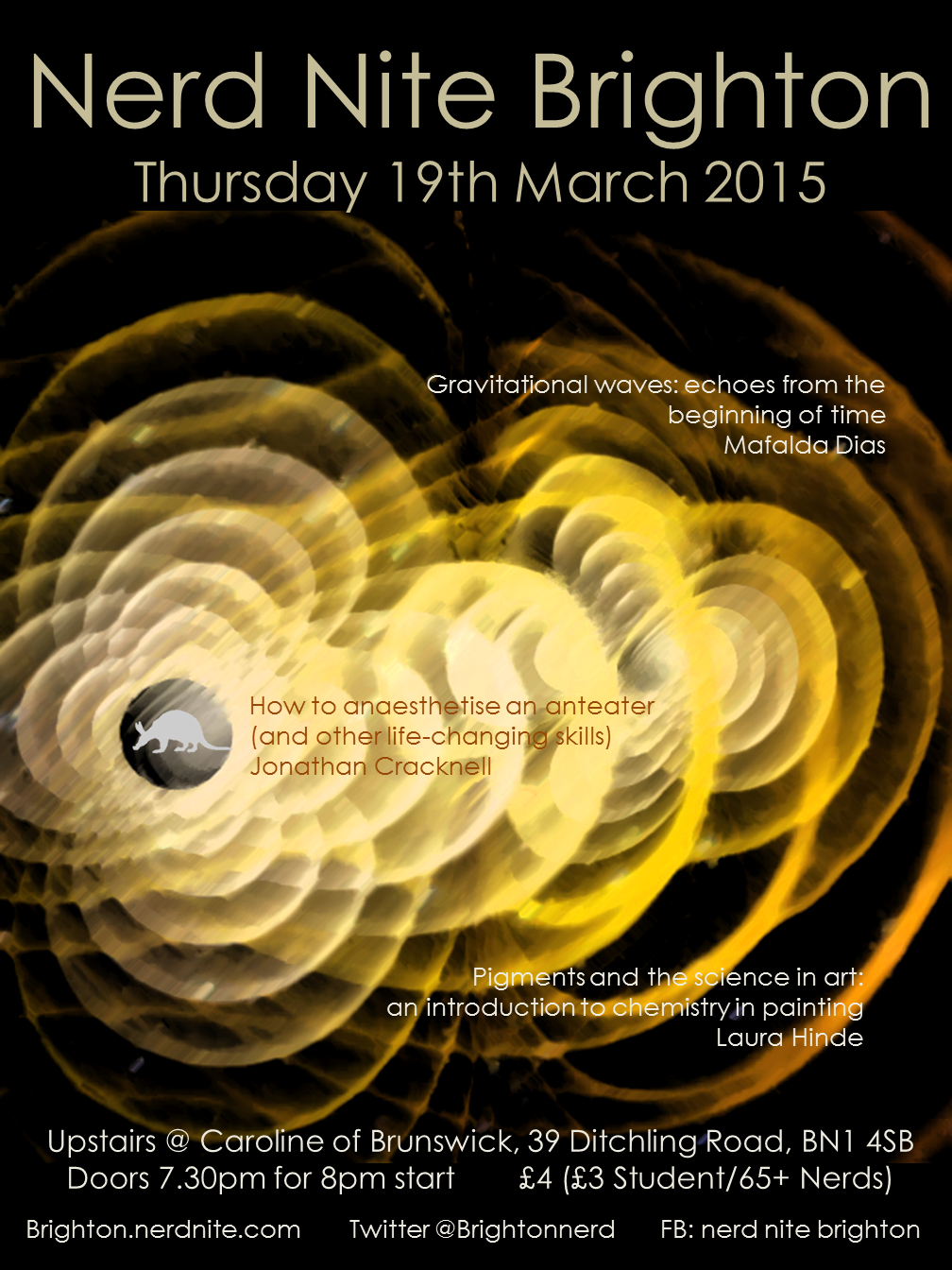 Well it seems like just yesterday we were all excited about our February Science Festival Special. If you missed it there are some pics on our Facebook site
Well it seems like just yesterday we were all excited about our February Science Festival Special. If you missed it there are some pics on our Facebook site
And now March has come round! Time is a bloody fast arrow.
This month:
1. How to anaesthetise an anteater (and other life-changing skills) – Jonathan Cracknell
Wildlife anaesthesia is an essential part of any conservation or health management programme when working with wild animals. This offers a range of challenges from how to sex a beaver, to undertaking an epidural in an elephant, but none so more than knowing how to intubate an anteater. This talk will like at the diverse challenges facing the modern zoo and wildlife veterinarian and most importantly answer that elusive question – how do you intubate an anteater?
Jonathan has had a varied career having worked in general practice, as an emergency and critical care clinician, a resident in anaesthesia at the Animal Health Trust, and as a wildlife and zoological medicine clinician internationally. His primary interests are conservation led initiatives, anaesthesia and welfare, and capacity and capability development for NGOs in Asia. He currently holds the post of Director of Animal Operations at Longleat Safari and Adventure Park.
2. Gravitational waves: echoes from the beginning of time – Mafalda Dias
The recent suggestion that gravitational waves as old as the Universe have been observed in the south pole shook up the physics community. But what are these strange waves? How can they be seen from the South pole? Why would their discovery be a turning point for fundamental physics?
Mafalda is a theoretical cosmologist at the University of Sussex. Her research examines the physics that might underpin very early Universe by studying the mechanisms that has given rise to the structures we can observe today. She is enthused by the prospect of using observations of the sky as a laboratory to probe fundamental physics. She completed her undergraduate studies in Porto, her hometown, before moving to Brighton for her PhD. As a good lover of fundamental science, she takes enormous pleasure in solving all sorts of riddles and mathematical puzzles, and folding origami.
3. Pigments and the Science in Art; An Introduction to Chemistry in Painting (with reference to a popular card game from the 1970s) – Laura Hinde
This talk will introduce nerds to material science by presenting various pigments used in historic paints, focussing on some unusual and possibly surprising ingredients. The wonders, the dangers, the chemistry of paints and all their glorious hues will have you looking at paintings in different way.
Laura Hinde is Paintings Conservator at the National Portrait Gallery. This means she likes fixing things and cleaning. Her research has her spending most of her time looking at things close up; paint, canvas, wood, pigments. She loves a microscope. She also likes Top Trumps. She graduated from Leeds University in 2004 BA in Italian and Art History. After a few years of this and that she went on from sweeping floors at a conservation studio to a Postgraduate Diploma in the Conservation of Easel Paintings at the Courtauld Institute of Art, London. She has been working as a paintings conservator at the National Portrait Gallery since 2010, where the lunchtime Craft Club is thriving. She also does painting conservation on a freelance basis.
_________________________________
We are back at our regular home (Caroline of Brunswick).
As always there will be free cake, tunes and big prize quizzes.
Tickets are £4 for a regular nerd and £3 for a student/over 65 nerd
Buy them from here
Remember we sell out EVERY MONTH now so strongly advise that you buy tickets online to avoid disappointment!
Looking forward to seeing you there!
Brighton Science Festival Special – 19/2/15
OMG it’s Brighton Science Festival time!
We are doing a SciFest special this month and we are being kindly hosted by the lovely folk at Komedia. We’ve bagged their main space so there’ll be plenty of room to stretch out.
Our line-up:
1. Little bangs in the Big Bang – Prof Mark Hindmarsh
What connects your kettle with the Higgs and a laser interferometer in space? Professor Mark Hindmarsh, a particle cosmologist at the University of Sussex, will turn the clock back to the first few picoseconds to explain.
2. Are animal viruses bad for our health? – Dr John Wood
There are many viral diseases of wild animals, most of which are unremarkable and have little impact on us. However some can jump into humans and create alarm and panic like Ebola and bird flu. John Wood will review these nasty viruses and explain what ducks, fruit bats, camels and civets all have in common.
John Wood was an influenza virologist at a World Health Organisation (WHO) laboratory in Hertfordshire. He advised the WHO on pandemic flu vaccines and led a laboratory engaged in developing vaccines against H5N1 viruses.
3. Science Faction: Peculiar stuff that might actually happen – Punk Science
We’re delighted to have The Science Museum’s resident comedy team Punk Science triumphantly return to Brighton for some more shenanigans. This time they’ll be examining how much science-fiction might actually have a basis in hard science. If previous experience is anything to go by there will be a lot of silliness perhaps with some abnormal sign language and crisp eating.
Do make sure you pop up and see them in the Big Smoke as part of the Science Museum’s Lates programme throughout the year.
We will be sure to have the usual music, cake, quizzes and laughter
Doors at 7.30pm for an 8pm start
£4 for regular nerds and £3 for NUS/65+ Nerds
Tickets from HERE
